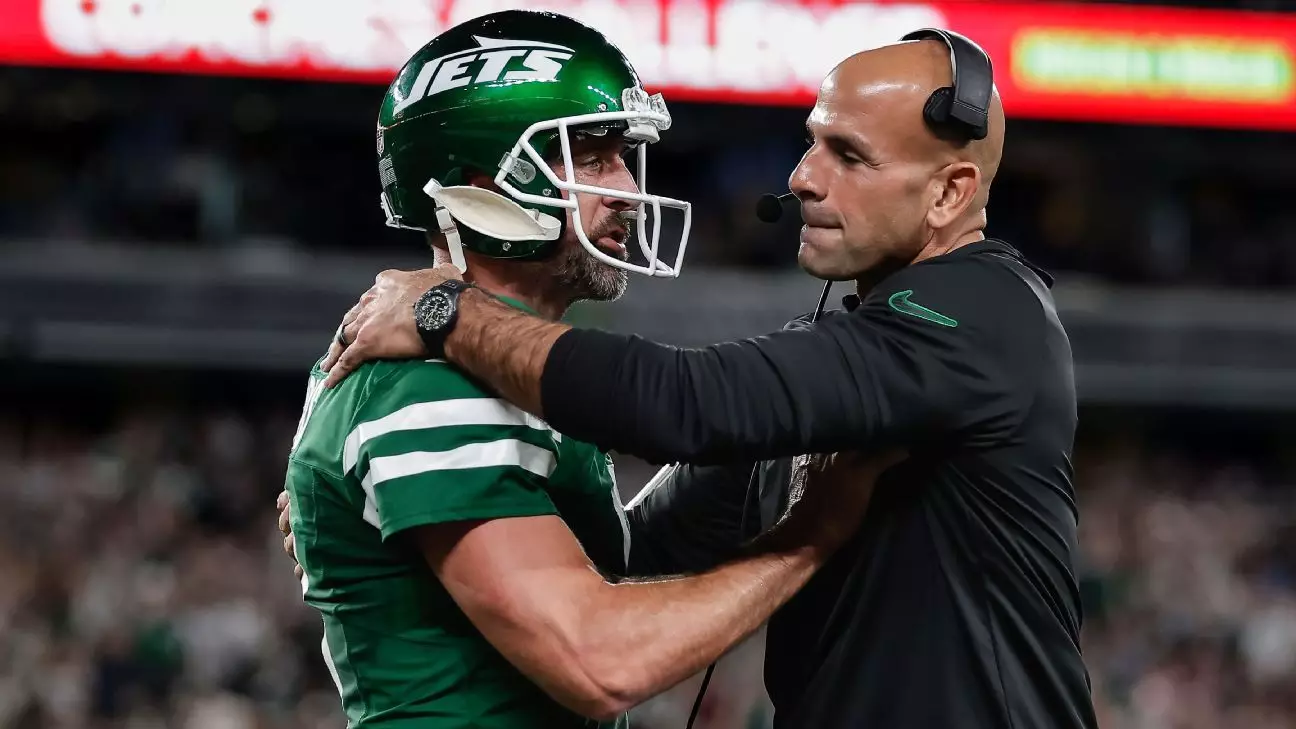In a commanding display of skill and determination, New York Jets quarterback Aaron Rodgers led his team to a decisive 24-3 victory over the New England Patriots at MetLife Stadium. The atmosphere was electric as Rodgers completed 27 of 35 passes for 281 yards and two touchdowns, showcasing a performance reminiscent of his prime years. His ability to evade pressure and complete passes on the move highlighted not just his technical prowess but also his resilience at the age of 40, marking a significant rebound from previous matchups that had raised concerns about his mobility.
Rodgers’ performance not only silenced critics but also reestablished his place among elite quarterbacks. By hitting over 75% of his passes while throwing for more than 250 yards, he joined an exclusive group of NFL legends, including Tom Brady and Drew Brees. This remarkable feat demanded a combination of accuracy, pace, and skill, which Rodgers demonstrated abundantly, especially in moments where he maneuvered outside the pocket. It was a stark contrast to his first two games, where he faced significant challenges in handling defensive pressure.
Perhaps the most memorable moment from the game was not just the scores or stats, but an unexpected sideline encounter between Rodgers and Jets head coach Robert Saleh. Following a touchdown that put the Jets ahead 14-0, Saleh approached Rodgers for what appeared to be a celebratory hug. However, Rodgers, with a body language that spoke volumes, declined the embrace with a light shove and a glare, indicating that such celebrations were premature. Their interaction quickly turned into a humorous anecdote, revealing the dynamics of the relationship between quarterback and coach.
Rodgers later quipped, “He’s not a big hugger usually, so I didn’t know he was going for the hug.” This light-hearted banter highlighted the camaraderie and familiarity within the team, which can be crucial during high-pressure games. Saleh acknowledged their earlier conversation about not getting too comfortable with a two-score lead, indicating the strategic mindset that fuels their approach to the game. Despite the temporary awkwardness, the chemistry between the two was evident, illustrating the balance of professionalism and personal rapport that is often necessary for success on the field.
The emotional stakes were higher for Rodgers, who returned to the site of his devastating Achilles injury from the previous season. The resilience he displayed throughout the game spoke to his character. Not only did he overcome a serious injury, but he also stepped back into his role under intense scrutiny—an inspiring testament to his journey. Every pass he threw illustrated his growth and determination to reclaim his status, and by the third quarter, the crowd’s chants of his name echoed his impact on the game and the fans.
Rodgers spread the ball across a diverse receiving corps, connecting with eight different receivers throughout the matchup, which emphasized his experience and strategic thinking. His touchdown pass to Allen Lazard was particularly poignant, blending past connections with present triumphs. Lazard’s gesture of handing Rodgers the touchdown ball symbolized both respect and recognition of the accomplishment at hand, reinforcing the bond shared among teammates forged through shared experiences and challenges.
As the game progressed, Rodgers orchestrated impressive touchdown drives that showcased the Jets’ offensive capabilities. Notably, a subsequent touchdown connection with Garrett Wilson effectively sealed their dominance in the contest. This moment marked both Wilson’s first touchdown of the season and a pivotal turning point in the team’s morale, injecting a sense of confidence that can be contagious in a season still unfolding.
Ultimately, Rodgers’ ability to navigate the pressures of the game and maintain composure under scrutiny solidified his role as a leader within the Jets organization. His performance is a reminder that tenacity, a supportive team environment, and effective coaching can overcome adversity. As Rodgers himself stated, “This was kind of the first step in playing like I know I’m capable of playing,” hinting at a positive trajectory ahead for both him and the Jets.
Aaron Rodgers not only led the Jets to victory but also provided a blueprint for resilience that can inspire both players and fans alike. As the season progresses, all eyes will be on him to see if he can maintain this momentum and continue to elevate his team’s performance on the grand stage of the NFL.

